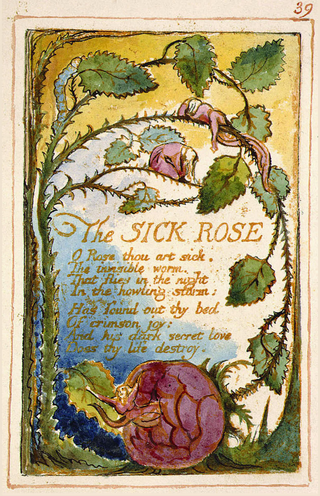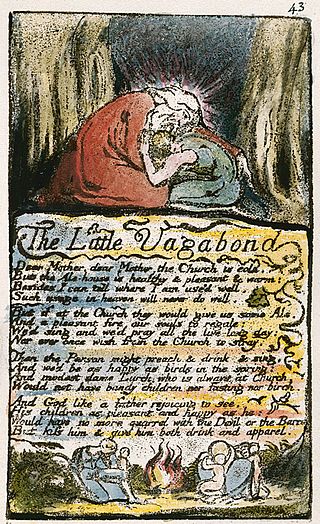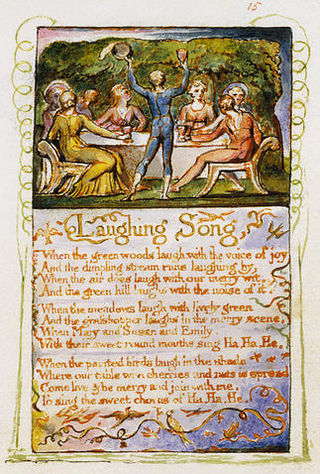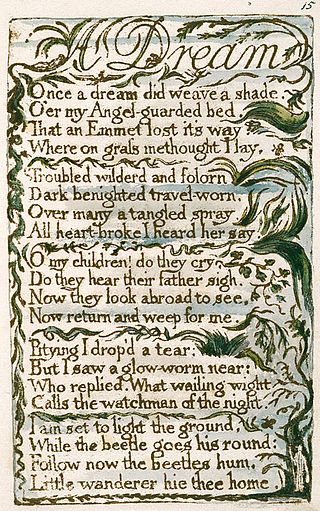
"The Echoing Green" is a poem by William Blake published in Songs of Innocence in 1789. The poem talks about merry sounds and images which accompany the children playing outdoors. Then, an old man happily remembers when he enjoyed playing with his friends during his own childhood. The last stanza depicts the little ones being weary when the sun has descended and going to their mother to rest after playing many games.

The Spectre is one aspect of the fourfold nature of the human psyche along with Humanity, Emanation and Shadow that William Blake used to explore his spiritual mythology throughout his poetry and art. As one of Blake's elements of the psyche, Spectre takes on symbolic meaning when referred to throughout his poems. According to professor Joseph Hogan, "Spectre functions to define individuals from others [...] When it is separated [from Emanation], it is reason, trying to define everything in terms of unchanging essences." Thus, according to Samuel Foster Damon, Spectre epitomizes "Reason separated from humanity" and "Self-centered selfhood" or, as Alexander S. Gourlay puts it, Spectre is "characterized by self-defensive rationalization".

"London" is a poem by William Blake, published in Songs of Experience in 1794. It is one of the few poems in Songs of Experience that does not have a corresponding poem in Songs of Innocence. Blake lived in London so writes of it as a resident rather than a visitor. The poems reference the "Two Contrary States of the Human Soul". The "Songs of Innocence" section contains poems which reference love, childhood and nature. Critics have suggested that the poems illustrate the effects of modernity on people and nature, through the discussion of dangerous industrial conditions, child labour, prostitution and poverty.

"The Little Black Boy" is a poem by William Blake featured in his collection Songs of Innocence published in 1789. The work was published during a period when slavery was still legal and the campaign for the abolition of slavery was in its nascent stages.

"The Blossom" is a poem by William Blake, published in Songs of Innocence in 1789.

"The Sick Rose" is a poem by William Blake, originally published in Songs of Innocence and of Experience as the 39th plate; the incipit of the poem is O Rose thou art sick. Blake composed the poem sometime after 1789, and presented it with an illuminated border and illustration, typical of his self-publications. Since the 20th century, the poem has been the subject of scrutiny by scholars for its oblique and enigmatic meaning, and bizarre, suggestive imagery.

Holy Thursday is a poem by William Blake, from his 1789 book of poems Songs of Innocence.

"Holy Thursday" is a poem by William Blake, first published in Songs of Innocence and Experience in 1794. This poem, unlike its companion poem in "Songs of Innocence" (1789), focuses more on society as a whole than on the ceremony held in London.

Earth's Answer is a poem by William Blake within his larger collection called Songs of Innocence and of Experience. It is the response to the previous poem in The Songs of Experience-- Introduction . In the Introduction, the bard asks the Earth to wake up and claim ownership. In this poem, the feminine Earth responds.

"The Lilly" is a poem written by the English poet William Blake. It was published as part of his collection Songs of Experience in 1794.

The Little Vagabond is a 1794 poem by English poet William Blake in his collection Songs of Innocence and of Experience. His collection, Songs of Innocence, was originally published alone, in 1789. The scholar Robert Gleckner says that the poem is a form of transformation of the boy in the poem "The School Boy", from Songs of Innocence.

"Infant Joy" is a poem written by the English poet William Blake. It was first published as part of his collection Songs of Innocence in 1789 and is the counterpart to "Infant Sorrow", which was published at a later date in Songs of Experience in 1794.

"The Shepherd" is a poem from William Blake's Songs of Innocence (1789). This collection of songs was published individually four times before it was combined with the Songs of Experience for 12 editions which created the joint collection Songs of Innocence and of Experience (1794). Blake produced all of the illuminated printings himself beginning in 1789. Each publication of the songs has the plates in a different order, and sixteen other plates were published posthumously.

The Voice of the Ancient Bard is a poem written by the English poet William Blake. It was published as part of his collection Songs of Innocence in 1789, but later moved to Songs of Experience, the second part of the larger collection Songs of Innocence and of Experience, 1794.
"Night" is a poem in the illuminated 1789 collection Songs of Innocence by William Blake, later incorporated into the larger compilation Songs of Innocence and of Experience. "Night" speaks about the coming of evil when darkness arrives, as angels protect and keep the sheep from the impending dangers.

"The Little Boy Found" is a poem by William Blake first published in the collection Songs of Innocence in 1789. Songs of Innocence was printed using illuminated printing, a style Blake created. By integrating the images with the poems the reader was better able to understand the meaning behind each of Blake's poems.

"The Little Boy Lost" is a simple lyric poem written by William Blake. This poem is part of a larger work titled Songs of Innocence which was published in the year 1789. "The Little Boy Lost" is a prelude to "The Little Boy Found".

"Laughing Song" is a poem published in 1789 by the English poet William Blake. This poem is one of nineteen in Blake's collection Songs of Innocence.

"The School Boy" is a 1789 poem by William Blake and published as a part of his poetry collection entitled Songs of Experience. These poems were later added with Blake's Songs of Innocence to create the entire collection entitled "Songs of Innocence and of Experience Shewing the Two Contrary States of the Human Soul". This collection included poems such as "The Tyger", "The Little Boy Lost", "Infant Joy" and "The Shepherd". These poems are illustrated with colorful artwork created by Blake first in 1789. The first printing in 1789 consisted of sixteen copies. None of the copies of Songs of Innocence are exactly alike as some of them are incomplete or were colored in posthumously "in imitation of" other copies.

"A Dream" is a poem by English poet William Blake. The poem was first published in 1789 as part of Blake's collection of poems entitled Songs of Innocence.


































